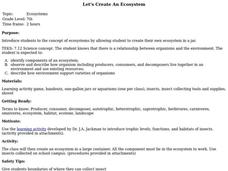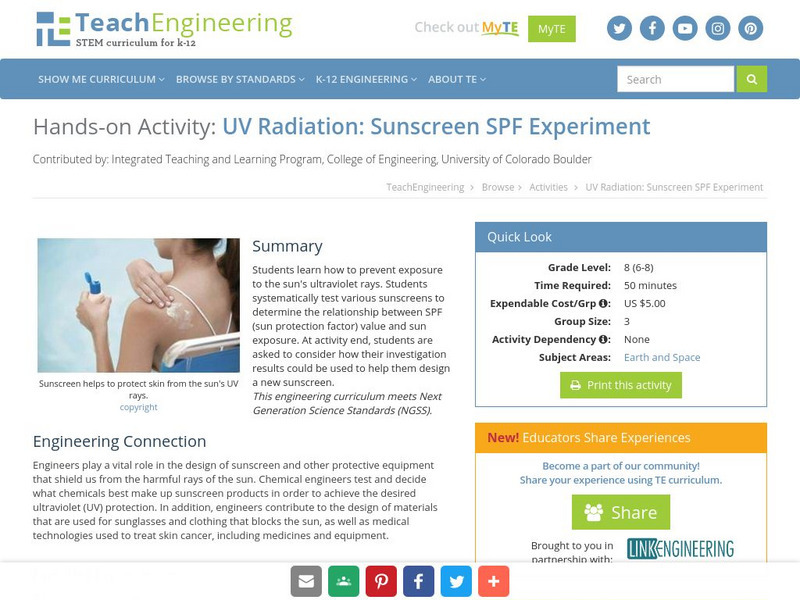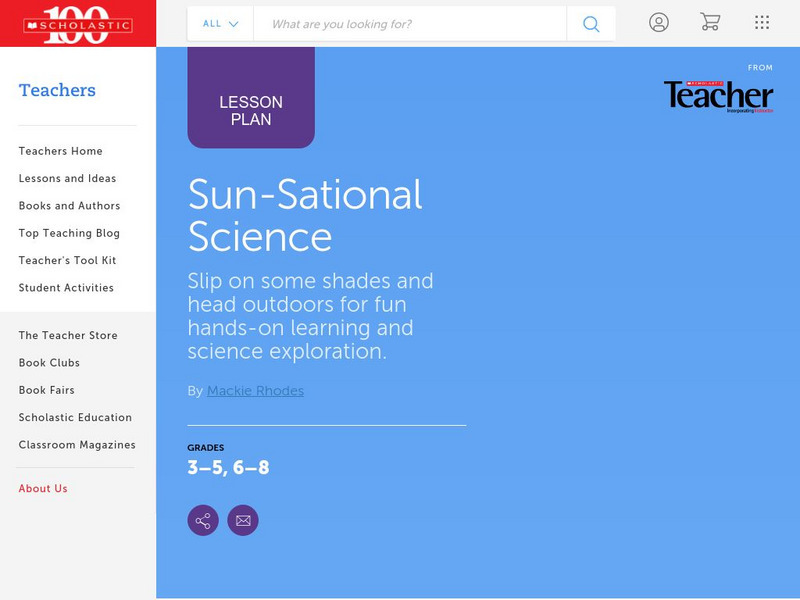Curated OER
Let's Create An Ecosystem
Seventh graders create ecosystems in a jar which they observe over the course of the school year.
Curated OER
Thunderstorms
Fourth graders investigate the attraction between two different charges to explain the concept of lightning in a thunderstorm.
Curated OER
Mushroom Prints
Students create a mushroom spore design on paper while studying the facts on fungi.
Curated OER
Science: Pigments and Photosynthesis
Students explore the process of photosynthesis by identifying chloroplasts and chlorophyll pigments. In a demonstration, they observe a demonstration connecting pigments with sunlight conversion into energy. Using paper chromatography,...
Curated OER
Make A Comet
Students make a comet out of corn syrup, ammonia, dirt, ice cream sticks, and more. In this comet lesson plan, students view how these ingredients turn from a solid to a gas.
Curated OER
Ecosystems
Learners work in small groups to create a poster illustrating the flow of energy through a typical ecosystem, then present their posters to the class.
Curated OER
Images of Our Changing Earth
Middle schoolers identify and explain that remote sensing can detect changes on the Earth's surface that occur over time, and name at least three: urbanization, deforestation, and succession. They select a global change issue to...
Curated OER
Build a Bubble-Powered Rocket
For this law of action and reaction worksheet, learners build a bubble powered rocket using a film canister, paper and effervescing tablets to create bubbles inside the canister of the rocket. The pressure inside causes the canister to...
Curated OER
Moon Journal
Students review the planets and major moons in the Solar System. In groups, they research and describe the various phases of the moon. They record their observations of the moon phases over a specific period of time and use the...
TeachEngineering
Teach Engineering: It Burns!
In this activity, students learn how to prevent exposure to the Sun's harmful ultraviolet rays. Students will systematically test various sunscreens to determine the relationship between spf (sun protection factor) value and sun...
National Geographic
National Geographic: Build a Solar Eclipse Viewer
This lesson focuses on How can you safely view a solar eclipse and solar activity? It provides step-by-step instructions for building the viewer and how to use it properly. It also provides a video and informational slides.
Crayola
Crayola: Fun in the Sun Visors
This activity shows children how to make sun visors using simple paper plates, markers, and a rubber band.
Scholastic
Scholastic Instructor: Sun Sational Science
Discover more about the sun when you visit this educational resource. The content of this site includes solar fun facts, experiments, and activities.
TED Talks
Ted: Ted Ed: Which Sunscreen Should You Choose?
Mary Poffenroth explains how sunscreens work and compares different application methods, SPFs, and active ingredients to help you make the best choice. [4:39]
Utah Education Network
Uen: Trb 3:5 Investigation 3 It's Hot
Activity helps to understand the effect of sunlight on the earth.
Texas Instruments
Texas Instruments: Comparing Sunscreens
In this activity, students use the UVB Sensor to measure the amount of UVB light that passes through a thin film of sunscreen. They analyze the relationship between the SPF values and the intensity of UVB light transmitted by the sunscreen.
PBS
Pbs Kids: Science Rocks: Build a Tent
This site provides instructions on how to build a tent including materials needed. It focuses primarily on a model tent but gives hints to adapt it to an outdoor tent that could provide shelter from the weather.
Curated OER
Kids Health: Heat Illness
Being out in the sun and heat, especially while exercising or participating in any physical activity, can lead to heat exaustion and heatstroke. Learn how to prevent getting sick while in the sun, and learn how to cool down if you feel ill.
National Institutes of Health
Niehs: Kids' Pages: You and Your Genes
Online children's story that teaches about genes and how they direct how you react to things in your environment. Click on "next" at the bottom of the story to see how different people respond differently to harmful substances.




















